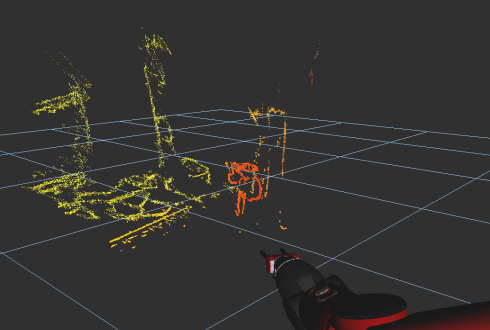Wageningen, The Netherlands
June 1, 2015

In cooperation with Harvard University, a framework is developed for the motion control of harvest robots. By adding a camera to the end-effector of a robot, visual information can be used whilst the robot is moving towards the target. Additionally a three-dimensional reconstruction of the scene can be made.
During the past 4 years a sweet-pepper harvesting robot was developed in the European project CROPS. However it turned out that implemented approach was not yet optimal for recognising all fruit. This approach only analyzed a single perspective, after which path planning guides the robot blindly to the target. Unfortunately a single viewpoint is not sufficient to obtain enough information about the crop.
In the new framework an alternative approach is implemented that should solve this problem. For this the plant is first scanned from multiple perspectives. After this the robot is moved towards the fruit incrementally, in each step using images from the end-effector to correct its pose.
The framework will be tested and used in the future series of harvesting robots, aiming on faster and more accurate harvesting cycle times.
Driedimensionaal beeld maakt oogstrobot efectiever
In samenwerking met de universiteit van Harvard, is er een raamwerk ontwikkeld voor de bewegingsaansturing van oogstrobots. Door een camera toe te voegen aan de grijper van een robot, kan visuele informatie worden gebruikt tijdens de beweging naar het object. Daarbij kan er tegelijktijdig ook een driedimensionaal beeld van de omgeving worden verkregen.
Tijdens het Europese project CROPS is de afgelopen 4 jaar gewerkt aan een paprika oogstrobot. De geïmplementeerde aanpak bleek echter nog niet optimaal om alle vruchten te herkennen. Deze aanpak bestond uit het analyseren van slechts een enkel perspectief, waarna een pad planning de grijper blind naar de vruchten geleidde. Door de vele occlusies in het gewas kan met een enkele blik niet voldoende informatie worden verkregen.
In het nieuwe raamwerk is gekozen voor een alternatieve aanpak die dit probleem moet oplossen. Hierin wordt de plant eerst vanuit meerdere perspectieven gescand. In plaats van een pad planning hierna volgt wordt er stapsgewijs dichter naar de vrucht bewogen. Hierbij wordt gebruik gemaakt van beelden van de camera om de grijper te corrigeren.
Het raamwerk zal worden gebruikt en getest in de toekomstige serie oogstrobots, met als doel de snelheid en precieze van de oogstcyclus te vergoten.